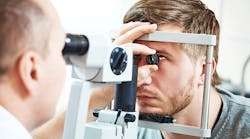A recent survey found that nearly two out of three American adults report having eye or vision problems, but most of them fail to have regular eye exams that could predict or prevent serious problems. Add me to the list.
Four years ago, I got Lasik surgery on my eyes. Having worn glasses (and later, contact lenses) since I was in second grade, the surgery was like a miracle. I wake up in the morning and I can see!
Until I got the surgery, I went to the eye doctor every year to get my contact lens prescription renewed. We have great vision coverage at work that pays for annual exams and a couple of hundred dollars toward contact lenses or glasses. There absolutely is no reason not to get regular checkups.
Since the surgery, I'm ashamed to admit I haven't been back to the ophthalmologist. And then I read the results of this poll and realized I am not alone in being foolish.
The survey commissioned by the American Academy of Ophthalmology found that 64 percent of adults had at least one or more of these issues with their eyes or vision:
- Blurry vision.
- Double vision.
- Difficulty seeing at night.
- Problems reading up close.
- Seeing flashes of light.
- Having red, watery eyes.
Despite having these problems, only 13 percent of these people (about one out of eight) reported they had seen a medical doctor for an eye exam.
Guilty as charged! Red, watery eyes? Sign me up. Blurry vision on occasion? Ditto. But I still didn't make an appointment with the eye doctor.
And then I managed to scratch one of my corneas and I ended up with what I fondly refer to as "vampire eye." Or maybe "zombie eye" is a better description. Whatever. It looked and felt terrible and my regular doctor forced me to see an ophthalmologist.
While the scratch turned out to be very minor, I did get a gentle scolding when the ophthalmologist found out it had been four years since my last eye exam. I found out during the visit that my eye problems (not the scratch, the redness and blurriness) were related to eye strain from staring at a computer for eight hours a day and my smartphone nearly every other waking moment. Reading glasses were prescribed, as were some eye exercises to help combat eye strain.
"Just like our hair goes gray, our hips weaken and our metabolism slows, our eyes are impacted by age," explains Rebecca J. Taylor, MD, an ophthalmologist in Nashville, Tenn, when the survey was released. "Common age-related eye diseases, such as macular degeneration, cataracts, diabetic retinopathy and glaucoma, can begin to steal your vision before you even realize it."
She says that having regular eye exams, usually starting around age 40, is important for catching these problems before vision loss happens.
"Many adults around age 40 begin taking steps to prevent their risk of heart disease, cancer, diabetes and other issues. Having regular exams to prevent potentially blinding eye disease should also be part of this overall health maintenance plan," says Taylor.
I was fortunate; my symptoms were not related to a more serious eye disease or an underlying health issue such as diabetes. However, a coworker was diagnosed with the early stages of glaucoma not too long ago and a neighbor's diabetes was discovered because he was experiencing vision problems.
They say eyes are the windows to the soul, but they also can be predictors of the health of the body.
As EHS professionals, you are concerned with protecting the eyes from flying objects, fumes, arc flash and other hazards. You probably maintain a supply of safety glasses and even suggest that employees use them at home for tasks like cutting the lawn, woodworking and using harsh cleaning chemicals. And that's all good.
But please don't forget to remind employees to get regular eye exams. Keep those windows to the soul bright and healthy.

